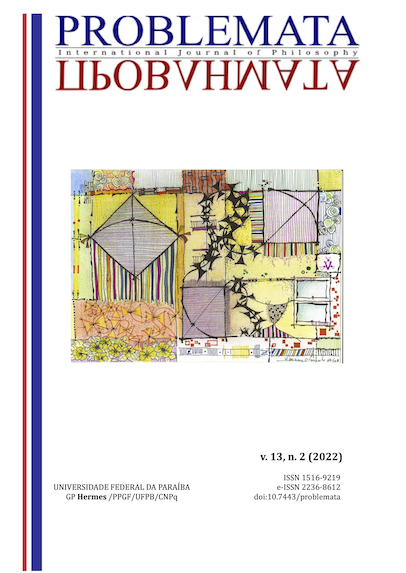THE TEMPORALITY AS BASIS ONTOLOGICAL IN MARTIN HEIDEGGER
DOI:
https://doi.org/10.7443/problemata.v13i2.62472Keywords:
Time, Heidegger, Existential, DaseinAbstract
The concept of temporality was thought by Martin Heidegger in Being and Time (1927), especially throughout the second section, instigating an important question: how to think about time in relation to the ontological project? The temporality here contains an understanding of the very form of the existence of the being that we are, as " threw" into the world (In-der-Welt-sein), as: Dasein. It seeks to understand how Dasein articulates and faces the demands of time. What goes through this layer of meaning is the fact that chronological time stops us with the obscurity of this search for the meaning of being. The notion of time is not reduced to the action of movement with successive and straight moments, in terms of equivalence where one can make and obtain its measurement. Time, in Heideggerian terms, presents itself as an existential phenomenon, and always occurs as an “opening”, as an existential possibility. Is perception possible, a philosophical encounter with the question or just an insight for the few? How can we think of time as a realization of the reality of being-there? So, we will take these and other questions here in this text in the exercise of thinking about how Heidegger puts temporality as existential and what we can expect from this ontological change.
Downloads
References
ABBAGNANO, Nicola. Dicionário de Filosofia. 2. ed. São Paulo: Martins Fontes, 2003.
COLLETE, Jacques. Existencialismo. Tradução de Paulo Neves. Porto Alegre, Rs: L&PM, 2009.
COLONY, Tracy. Before the Abyss: Agamben on Heidegger and the Living. Continental Philosophy Review. N. 40 p. 1-16, 2007. Disponível em: https://philpapers.org/rec/COLBTA, Acessado em 10 de maio de 2018.
DASTUR, Françoise. Heidegger e a questão do tempo. Lisboa: Instituto Piaget, 1990.
DEKENS, Olivier. Compreender Kant. Tradução Paula Silva. São Paulo: Edições Loyola, 2008.
DONATO, Claudio. O questionamento da técnica em Heidegger. Joinville: Editora CDA Clube de Autores, 2014.
GIORDANI, Mário Curtis. O existencialismo à luz da filosofia cristã. Aparecida, SP: Idéias & Letras, 2009.
GREAVES, Tom. Heidegger. Tradução: Edgar Marques. Porto Alegre: Artmed, 2012.
HEIDEGGER, Martin. Ser e tempo. 3. ed. Petrópolis: Vozes, Bragança Paulista, SP Universidade São Francisco 2008.
HEIDEGGER, Martin. Seminários de Zollikon. Trad. Gabriela Arhold e Maria de Fátima A. Prado. São Paulo: Editora Vozes / Educ Puc / SP, 2001.
HEIDEGGER, Martin. O conceito de tempo. Cadernos de tradução. São Paulo: Departamento de Filosofia da USP. n.2, p. 7-30, 1997.
INWOOD, Michael. Dicionário Heidegger. Trad. Luísa Buarque de Holanda. Rio de Janeiro: Jorge Zahar, 2002.
KANT, Immanuel. Doutrina transcendental dos elementos: primeira parte estética transcendental. Coleção: Os pensadores. Trad. Valério Rohden e Udo Baldur Moosburger. São Paulo: Nova Cultural, 1999.
MACDOWELL, João A. A gênese da ontologia fundamental de Martin Heidegger: ensaio de caracterização do modo de pensar de Sein und Zeit. São Paulo: Loyola, 1993.
MORA, José Ferrater. Dicionário de filosofia tomo II - (E-J). São Paulo: Edições Loyola, 2001.
RICHARDSON, Willian J. Heidegger, Througt Phenomenology to Trought, Preface by Martin Heidegger. 4. ed., New York, Fordham University, 2003.
SAFATLE, Vladimir. O circuito dos afetos: corpos políticos, desamparo e o fim do indivíduo. 2.ed. rev. 1 reimp. Belo Horizonte: Autêntica Editora, 2016.
SAFRANSKI, Rüdiger. Heidegger, um mestre da Alemanha entre o bem e o mal. Tradução: Lya Lett Luft. São Paulo: Geração Editorial, 2a ed. 2005.
SARAMAGO, Ligia. Topologia do ser: lugar, espaço e linguagem em Martin Heidegger. Rio de Janeiro: Loyola. PUC-Rio, 2008.
STRAKE, Silvia Cristina Salvan. A história no pensamento heideggeriano de Ser e Tempo. São Paulo, SP, 2006. 129 p. Dissertação (Mestrado) – Pontifícia Universidade Católica de São Paulo, São Paulo, 2006 Disponível em: < https://sapientia.pucsp.br/bitstream/handle/11737/1/FIL%20%20Silvia%20Cristina%20S%20Strake.pdf>. Acesso em: 05/12/2021.
Downloads
Published
Versions
- 2022-09-26 (2)
- 2022-09-23 (1)
Issue
Section
License
Copyright (c) 2022 Eu Decothé Decothé

This work is licensed under a Creative Commons Attribution 4.0 International License.
Authors who publish with this journal agree to the following terms:
- Authors retain copyright and grant the journal right of first publication with the work simultaneously licensed under a Creative Commons Attribution License that allows others to share the work with an acknowledgement of the work's authorship and initial publication in this journal.
- Authors are able to enter into separate, additional contractual arrangements for the non-exclusive distribution of the journal's published version of the work (e.g., post it to an institutional repository or publish it in a book), with an acknowledgement of its initial publication in this journal.
-
- Authors are permitted and encouraged to post their work online (e.g., in institutional repositories or on their website) prior to and during the submission process, as it can lead to productive exchanges, as well as earlier and greater citation of published work (See The Effect of Open Access).





